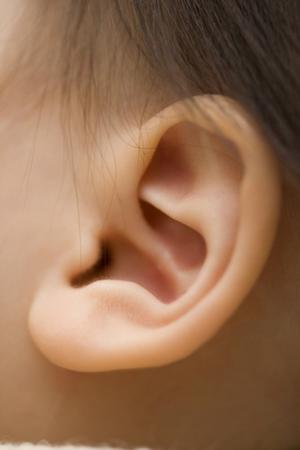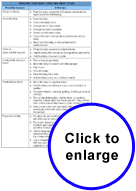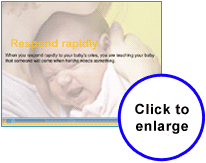MODULE 8
Healthy Family
Test Your Knowledge
|
|
The following exercise will help you learn a little more about colic and provide you with some coping techniques.
Click on the option button which corresponds to the correct answer and verify your answer by clicking on the "Check" button.
|
1 |
We do not know the cause of colic. |
|
2 |
Colic always occurs during the night. |
|
3 |
Colic begins at birth and disappears when the baby is two months old. |
|
4 |
Colic is often mistaken for crying related to other causes. |
|
5 |
If your baby has colic, you may need help. |
|
6 |
A calm atmosphere can help a baby with colic. |
|
7 |
Babies with colic should never be placed on their tummy. |
|
8 |
Noise and movement can sometimes help colicky babies. |
|
9 |
If you smoke, the nicotine is passed to the baby in the breast milk and can make the baby irritable. |
f. Colic
Colic is not an illness. A colicky baby cries a lot more than other babies. Nothing seems to comfort or stop them from crying. A colicky baby can be frustrating for parents. If you have a colicky baby, do not blame yourself because you are not responsible.

A baby with colic
- cries as if in pain after a feeding.
- pulls his knees up to his chest.
- may pass gas or vomit.
- cries for long periods no matter what you do.
e. Crying
All babies cry and many babies cry a lot. They cry because it is the only way they have to let you know that they need something.

When your baby cries, try to find out why. With time, you will recognize your baby's different cries and know what to do.
Babies cry because they need food, love, attention, or cuddling. When you respond to crying, you are helping your baby learn that help and love come when needed. A baby whose needs are met will feel safe, secure, and loved, not spoiled.
The following table will help you identify the reasons why your baby cries and what to do.
Sometimes, no matter what you do, your baby will continue to cry. This can be very frustrating.
 |
Babies are very easily hurt if they are handled rougly or shaken. Shaking your baby can cause death or permanent brain damage. Make sure that everyone who handles your baby knows about ''Shaken Baby Syndrome''. |
It is easy to say ''stay calm'', but this can be very difficult to do. If you feel your temper rising and are afraid that you might hurt your baby, you should:
|
d. Sleep
To help lower the risk of Sudden Infant Death Syndrome (SIDS), a healthy baby should be placed on his/her back to sleep for every sleep. The safest place for a baby to sleep is in a crib, cradle, or bassinet that meets current Canadian regulations. Also, infants who share a room with a parent or caregiver for the first 6 months have a lower risk of SIDS.
Newborns snooze and sleep whenever they are tired. They have no real sense of being "awake" or "asleep". Each new baby establishes a pattern of sleeping and waking. As you get to learn your baby's patterns, you will know when he or she is sleeping, awake, and when in a quiet alert state.

You can help your baby learn the difference between sleeping and waking by putting the baby in their crib when he or she is very sleepy and interacting and communicating with your baby when he or she is awake. Babies will learn to associate their crib with sleep.
Here are a few tips to make the nights easier.
Babies who lie in one position for long periods can develop flat spots on their heads. This happens because the bones of the baby's skull are very soft in the first year of life. In addition, babies have weak neck muscles and have difficulty turning their heads on their own.
This is what you can do to prevent your baby from getting flat spots on his/her head.
c. Vitamin D
Breast milk provides all the nutrients your baby needs. In certain cases, supplements may be recommended.
Vitamin D is needed to develop healthy bones and teeth. Health Canada recommends giving a Vitamin D supplement to babies who are breastfed from birth. You should continue giving the supplement until such time that he or she gets enough Vitamin D in other foods or until the baby reaches one year old.
For more information about Vitamin D supplements, consult a health care professional - doctor, pharmacist, dietician, or nutritionist.
a. Breastfeeding
Breast milk is the perfect food for your baby. You will find all the information you need to successfully breastfeed your baby in Module 4 entitled "Choosing to Breastfeed".

Breastfeeding is the natural way to feed your baby, but that does not mean that you will automatically know how to do it. Most mothers need advice and support especially during the first six weeks when everything is new.
Here are a few tips to help you breastfeed.
B. BABY CARE
Caring for an infant requires skill and practice. No one is born knowing how to bathe, dress, feed, and diaper a baby. Most parents learn these skills as their baby grows.

Don't worry if you feel awkward and uncertain at first. In no time, looking after your baby will feel natural.
d. Movements Babies Make
Newborns have a certain amount of control over their muscles. They can move their arms and legs, hold your finger, and turn their head toward the breast.
Babies' heads are wobbly and need to be supported when picked up. Babies cannot balance their heads well until they are a few months old.

e. Baby's Development
b. What Babies Hear
Newborns have excellent hearing. In fact, while they are in the womb, they can hear their own heartbeats as well as noises from the outside.

Babies like to listen to voices, music, and sounds like a washing machine or a dishwasher.
Sudden loud noises can make babies cry or wake them up. Even so, there is no reason to keep the house quiet for the baby. Babies get used to everyday noises.







